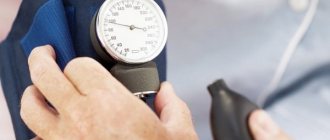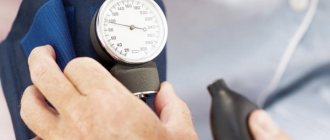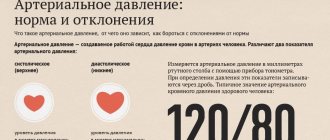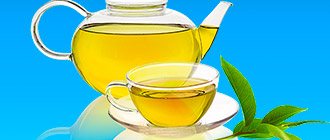General recommendations for nutrition for hypotensive patients:
- Meals should be small and frequent. If you eat a large amount of food at once, you will become oversaturated (overeating), and your blood pressure will drop further.
more. - In this state, you should not allow yourself to feel hungry, no exhausting diets for weight loss (hypotonic people are usually quite thin people), no long breaks between meals.
- If you can’t eat on time, you need to be prudent: always carry something nutritious and high-calorie, preferably sweet, with you, just in case. It could be caramel, halva, a piece of chocolate, nuts, dried fruits, banana. When you feel the first attack of weakness caused by hunger, you must immediately drown it out by eating some of these foods. Prolonged fasting with low blood pressure can cause fainting.
- Hypotonics are much luckier in terms of nutrition than hypertensives. People with low blood pressure are allowed to eat almost everything, but, of course, in moderation. Food should be tasty, healthy, high in calories, varied and rich in vitamins. A balanced diet that includes healthy microelements, fats, proteins, and carbohydrates in sufficient quantities will help you stay in shape and regularly recuperate.
- Iron deficiency anemia is a common companion to hypotension. Therefore, the menu of a person with low blood pressure should include foods containing iron (buckwheat, liver, pomegranate, walnuts, spinach).
- With hypotension, there is often a poor appetite; it can be increased by consuming hot and spicy spices, as well as by the pleasant appearance of the prepared dish. A beautiful table setting will not go amiss. The process of eating should bring pleasure and evoke positive emotions. It is good to stimulate the appetite of a person with low blood pressure with a long walk before meals: fresh air and moderate fatigue can cause a healthy feeling of hunger.
- Among other things, a hypotensive person must monitor his emotional background. Excessive excitement and neuroses can cause either complete loss of appetite or insatiable hunger. Both will have an equally bad effect on blood pressure, which may drop even further.
What blood pressure is considered normal?
The result of measuring pressure is two digits. The first is systolic pressure (at the moment when the heart contracts and pushes blood into the arteries). The second number is diastolic pressure (it is minimal and corresponds to the moment when the heart is relaxed). The absolute norm is considered to be 120/80 mmHg. Art., but for each person its own meaning will be normal. The individual norm depends on many factors, for example, weight and age. Also, stress, recent consumption of coffee or large amounts of liquid, overwork, physical activity, and other factors may affect the measurement results (Fig. 1).
Figure 1. What pressure is considered elevated. Source: MedPortal
Low blood pressure is considered to be below 90/60 mmHg. Art., elevated - if the values rise above 140/90 mm Hg. Art. These conditions manifest themselves in different ways.
Hypotension (low blood pressure) may cause the following symptoms:
- dizziness;
- nausea;
- loss of consciousness;
- weakness, fatigue;
- decreased concentration;
- deterioration of vision (everything becomes faded, blurry).
Hypertension (high blood pressure) may have the following symptoms:
- headaches, pain behind the sternum, in the heart area;
- shortness of breath (especially during physical exertion);
- dizziness;
- nosebleeds;
- nausea, vomiting.
Important! With both hypertension and hypotension, there may be no symptoms for a long time. Therefore, it is better to periodically monitor your blood pressure by measuring it with a tonometer.
Question answer
Many people suffer from low blood pressure, but not everyone knows about their diagnosis, attributing the pathological condition to increased fatigue, lack of sleep and stress.
You need to see a therapist. It is important to make a clear diagnosis and examine the internal organs that may have been damaged due to the disease. In this case, you most likely cannot do without medications, but only a doctor can prescribe a treatment regimen.
We advise you not to delay your visit to a therapist. He must conduct an examination and identify pathology in order to begin qualified treatment. If this is not yet possible, you can take herbal infusions and streamline your lifestyle to improve its quality. Eat properly and balanced, get quality rest and provide your body with the required physical activity.
We described in detail about methods of dealing with unpleasant symptoms in the article. But you definitely need the help of a local therapist. It is necessary to conduct a full examination and identify all pathologies of the body in order to take comprehensive measures for its treatment.
How do foods affect blood pressure?
Blood pressure is affected by both the composition of a person's diet and their eating habits, including how often they eat, how large their portions are, and how much fluid they drink. A healthy, balanced diet is one of the conditions for maintaining a healthy cardiovascular system, normal heart function and optimal blood counts. All this is directly related to blood pressure values.
What foods increase blood pressure?
There are a number of food products that increase the tone of the walls of blood vessels, the volume of fluid (and blood pumped), and also compensate for the deficiency of vitamins associated with hypotension.
Blood pressure increases when you eat the following foods:
- Salt, additives, seasonings containing sodium: retain fluid, increasing its volume in the body, increasing the volume of blood pumped. Salt intake should not be too high even with hypotension. WHO recommends consuming no more than 5 g of salt daily (1 teaspoon).
- Products containing caffeine: coffee, green tea, cocoa, strong sweet tea tone up and increase heart rate.
- High-calorie dishes. Baked goods, meat products, cheese, sweets, and high-fat dairy products provoke an increase in blood sugar, which causes blood pressure to rise. It is important for people with hypotension to eat foods that are nutritious enough, but they need to be careful that they are not excessively high in calories or contain too many carbohydrates or saturated fats.
- Products containing vitamins C, B12, E. With a deficiency of these vitamins, anemia develops, which is associated with the appearance of hypotension. By normalizing their consumption, you can reduce its manifestations. Citrus fruits, parsley, and red bell peppers contain a lot of vitamin C. Vitamin B12 is found in eggs, meat, and dairy products. Vegetable oil, avocados, and nuts contain a lot of vitamin E.
Important! Some foods prohibited for hypertensive patients can increase blood pressure: fatty, fried, too spicy foods, but using them to cope with hypotension is not recommended. Such food increases cholesterol levels in the blood, has a bad effect on the digestive system, and can cause additional health problems.
Foods that sharply increase blood pressure
Hypotension can make a person feel unwell, and it is important to know what to eat to raise blood pressure quickly. The following will help you feel better:
- black coffee;
- strong black tea;
- bitter chocolate;
- salty foods (this could be salted cheese, pickled vegetables, salted fish);
- prunes, dried apricots or other dried fruits;
- pomegranate juice;
- honey.
These products should only be used if it is known for sure that poor health is caused by hypotension. You can verify this by measuring your blood pressure. If symptoms associated with hypotension appear frequently, you should consult a doctor (general practitioner or cardiologist) and follow his recommendations.
Coffee and chocolate contribute to a rapid increase in blood pressure. Photo: nanka-photo / Depositphotos
What foods increase blood pressure during pregnancy?
In the first half of pregnancy, against the background of hormonal changes, blood pressure may decrease due to a decrease in the tone of the walls of blood vessels. This is normal, but if you experience symptoms associated with hypotension, you should inform your doctor. Blood pressure levels should return to normal after childbirth. If it becomes low during pregnancy, you need to make sure that this is not caused by anemia (for this, a blood test is taken).
To increase blood pressure during pregnancy, only certain foods can be used: chocolate, tea, pomegranate juice. Even they are not advisable to consume in large quantities so that the pressure does not become too high. This can be dangerous. It is also undesirable to increase the consumption of water or coffee (this may create additional stress on the kidneys), spicy, fatty, salty or too high-calorie foods. It is better to consult with your doctor and get nutritional recommendations from him, taking into account your general health, the duration of your pregnancy, and the characteristics of its course.
During pregnancy, you should be more careful when choosing your diet. Photo: Amina Filkins: Pexels
What foods should you not eat if you have high blood pressure?
Some foods can not only normalize blood pressure, but also increase it excessively. Eating these foods may be dangerous if a person already has hypertension. In this case, follow a special diet, excluding or limiting the consumption of the following foods:
- salt, seasonings, food additives containing sodium;
- strong tea, coffee containing caffeine;
- fatty, fried, spicy foods;
- pickles and canned foods;
- smoked meats;
- baked goods, sweets;
- fast food;
- sweet carbonated drinks;
- ready-made sauces, seasonings, flavor enhancers, and other additives that may contain sodium;
- frozen semi-finished products: pizza, dumplings and other similar dishes (may contain a lot of sugar, sodium, saturated fat to preserve taste);
- alcohol.
To prevent excessive stress on the heart and the appearance of essential hypertension, you need to adhere to a healthy, balanced diet in the same way as when preventing hypotension. Both hypertensive and hypotensive patients are equally benefited from fresh vegetables, nuts, herbs, fruits, whole grains, lean meat, poultry and fish. If your blood pressure is high, you need to eat more foods containing potassium, magnesium, and calcium. Bananas, beans, spinach, and sunflower seeds are especially useful.
Differences between products for men and women
People suffering from hypotension experience more than just discomfort. The disease can cause more serious illnesses and manifest itself differently in different sexes. Thus, women have disrupted menstrual cycles, men experience sexual problems.
And also read on our website: Features and description of the Dash diet for hypertension, as well as menus and recipes for the week
Pressure 100/65 in men and 95/60 in women are average values and serve as a guideline. If they change towards even lower values, a doctor’s consultation is necessary to avoid further complications.
Scientists have found that women suffer from hypotension much more often than men. According to statistics, there are 60% fewer hypotensive men than the fairer sex.
Speaking about the range of foods that can increase blood pressure, it is worth noting that there is no special diet for hypotensive people as such.
Each body is unique, so the same set of products does not always have the same effect. To achieve the maximum therapeutic effect for hypotension, it is necessary to combine foods.
Based on the above, the diet for low blood pressure for men and women is selected individually by the attending physician. This takes into account not only the physiological characteristics of the body, but also the level of physical activity. However, there are several practical tips that should become the rule and be followed unquestioningly:
- the daily diet should be divided into several doses;
- it is advisable to eat food at the same time, observing a certain interval, for example, every 3 hours;
- The menu must contain products recommended for increasing blood pressure.
Hypotonic people should fill their daily menu with enough water and salt. This simple advice will eliminate the disease and quickly stabilize blood pressure.
General recommendations for nutrition for hypotensive patients
With hypotension, it is important to adjust both the diet and diet. There are several eating habits that contribute to high blood pressure:
- Eat more often, but in small portions. This will ensure a constant supply of energy and high tone.
- Drink more water. When dehydrated, the volume of circulating blood decreases and blood pressure drops. If a person drinks enough water, the blood volume will be larger and the blood pressure will be higher. You need to additionally increase the volume of fluid you drink in hot weather and during physical activity.
- Don't skip meals. Such omissions can provoke overeating, which will cause blood pressure to drop.
- Reduce alcohol consumption. It causes dehydration and may worsen hypotension.
To improve your health with hypotension, you need to change your diet as follows:
- Get enough salt from food. Hypotonic people can eat dishes with added sea or table salt, as well as canned vegetables, cheeses, and salted fish. This will help retain fluid in the body and increase blood volume to increase blood pressure. In this case, total salt consumption should not exceed 5 g per day.
- Drink caffeinated drinks. It is better if it is natural coffee, black or green tea. The caffeine they contain causes heart rate to increase and blood pressure to rise. This effect is temporary. It should not be overused: if a person drinks a lot of coffee or tea, it can have a bad effect on heart health. In addition, over time, tolerance to caffeine may develop, and it will no longer provide a tonic effect.
- Get more vitamin B9 and B12 from foods. Hypotension may be associated with anemia caused by a deficiency of B vitamins. Hypotonic people need to eat more foods containing vitamin B12 (fish, chicken, eggs, low-fat dairy products) and B9 (broccoli, asparagus, lentils and chickpeas, liver).
- Control your carbohydrate intake. If your diet contains a lot of foods containing carbohydrates, this can have a bad effect on your heart condition and cause anemia. In addition, such foods are quickly digested, after which the pressure drops sharply. To reduce the symptoms of anemia, you need a balanced diet. It should not be overloaded with foods containing easily digestible carbohydrates (sweets, starchy foods, sweet vegetables, fruits and dried fruits, foods and drinks with added sugar).
In addition to nutrition, healthy habits such as good sleep and exercise are important (Figure 2).
Figure 2. General recommendations for hypotensive patients. Source: MedPortal
List of foods you can eat for hypotension
Hypotonic people can eat almost any food, but it is important that the diet remains balanced. The menu can include:
- fresh vegetables and salads made from them with added salt (but it is better to limit the overall use of salt and control it so that it does not provoke swelling);
- boiled or baked vegetables;
- cereals;
- fruits, dried fruits in limited quantities;
- meat, poultry, fish (preferably low-fat so that the level of cholesterol in the blood does not increase);
- cheeses, dairy, fermented milk products;
- bread, pastries, sweets (in limited quantities);
- chocolate;
- coffee and other caffeinated drinks;
- eggs;
- spices, hot seasonings (including ginger, pepper).
Additional dietary restrictions may apply that are not related to high or low blood pressure. To take them all into account, it is better to create a menu together with your therapist or nutritionist.
To prevent hypotension
Some foods increase blood pressure and prevent the development of hypotension. Doctors recommend including the following dishes that increase blood pressure for prevention purposes for all people prone to hypotension:
- Eggs;
- Chicken's meat;
- Cereals;
- Buckwheat;
- Sprouted wheat grains;
- Barley grits;
- Cottage cheese;
- Cheeses;
- Legumes (lentils, beans, peas);
- Butter;
- Fermented milk products;
You can quickly increase your blood pressure by preparing a treat in advance that has numerous beneficial properties and excellent taste. For these purposes, you will need to combine pre-chopped dried apricots, lemon, walnuts and prunes taken in identical proportions. All ingredients should be mixed well, poured with natural liquid honey and stored in the refrigerator. It is recommended to use the product 1 tbsp. l. immediately before the meal. This dish increases blood pressure and gives a boost of energy.
Muesli containing honey, nuts, oatmeal and dried fruits has an identical effect. These products raise blood pressure and have a tonic effect. You can buy them in the store or prepare them yourself at home.
To prevent changes and upward surges in blood pressure, it is important to avoid overeating, as well as eating excessively hot or, on the contrary, cold food!
Muesli with dried fruits - a fast-acting remedy for increasing blood pressure











